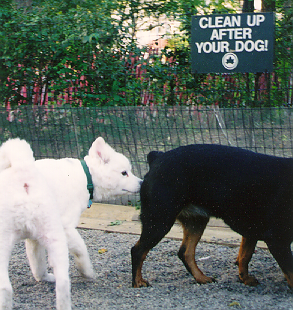Ch 4: Adolescent Dog Training (18 weeks - 2 years)

By now you're probably quite exhausted by your puppy-raising efforts. Hopefully, though, you are justifiably proud of your well-mannered, well-behaved, highly socialized dog with dependable bite inhibition. However...
Adolescence is a time of change.
To ensure that your attentive, mannerly and friendly puppy remains attentive, mannerly and friendly throughout adulthood, you need to accelerate socialization and training. Do not take your puppy’s stellar qualities for granted. Make a point always to praise your dog when he acts appropriately and to reward him whenever he is exceptionally well behaved.
Your dog needs to meet unfamiliar people on a regular basis. . In other words, your dog needs to be walked at least once a day. Your puppy may be taken for rides in the car and to visit friends' houses as early as you like. From the time your puppy is four months old, walk him on a regular basis — at least once a day. Otherwise, if your dog is confined to your house and only meets the same familiar people over and over, he will desocialize surprisingly quickly and soon grow to be wary and fearful of strangers, especially children and men.
Also, your dog needs to meet unfamiliar dogs on a regular basis. It is a fact of life that not all dogs get along. However, if you gave your puppy plenty of opportunities to play with other puppies and dogs and so develop solid bite inhibition, it is highly unlikely that your dog will injure another dog when scrapping. When dogs have reliable bite inhibition, most dogfights are no more than dog arguments. Continue socializing your dog with other dogs on walks and in parks.
The prime purpose of puppy husbandry is to produce a friendly, confident, and biddable pup, so that you can face the behavior and training challenges of your dog's adolescence, and your dog can deal with the immense social upheaval that dogs, especially males, face as they navigate adolescence. It is much easier to approach doggy adolescence with an already socialized and well-trained dog. However, maintaining your dog's socialization and training through his adolescence can be tricky if you don't know what to expect and how to deal with it.
Behavior is always changing, sometimes for the better, sometimes for the worse. Things will continue to improve if you continue working with your adolescent dog, but they will definitely get worse if you don't. Both behavior and temperament will tend to stabilize, for better or worse, as your dog matures around his second birthday for small dogs or third birthday for large dogs. But until then, if you don't keep on top of things, there can be precipitous and catastrophic changes in your dog's temperament and manners. Even when your dog reaches maturity, you should always be on the alert for the emergence of unwanted behaviors or traits, which you must quickly nip in the bud before they become hard-to-break habits.
Do you want to learn more about dog training?
Join The Top Dog Academy and get access to videos, worksheets, podcasts, and more, about dog training, using easy and effective methods that are enjoyable for you and your dog. When you join the Top Dog Academy you also get access to personalized email support so you can train your puppy yourself. Use this link to get your first month for free.




